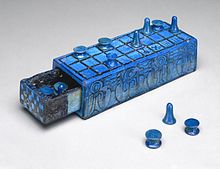Portal:Games
The Games Portal

A game is a structured type of play, usually undertaken for entertainment or fun, and sometimes used as an educational tool. Many games are also considered to be work (such as professional players of spectator sports or games) or art (such as jigsaw puzzles or games involving an artistic layout such as Mahjong, solitaire, or some video games).
Games are sometimes played purely for enjoyment, sometimes for achievement or reward as well. They can be played alone, in teams, or online; by amateurs or by professionals. The players may have an audience of non-players, such as when people are entertained by watching a chess championship. On the other hand, players in a game may constitute their own audience as they take their turn to play. Often, part of the entertainment for children playing a game is deciding who is part of their audience and who is a player. A toy and a game are not the same. Toys generally allow for unrestricted play whereas games present rules for the player to follow.
Key components of games are goals, rules, challenge, and interaction. Games generally involve mental or physical stimulation, and often both. Many games help develop practical skills, serve as a form of exercise, or otherwise perform an educational, simulational, or psychological role. (Full article...)
Selected article -
A play-by-mail game (also known as a PBM game, PBEM game, turn-based game, turn based distance game, or an interactive strategy game.) is a game played through postal mail, email, or other digital media. Correspondence chess and Go were among the first PBM games. Diplomacy has been played by mail since 1963, introducing a multi-player aspect to PBM games. Flying Buffalo Inc. pioneered the first commercially available PBM game in 1970. A small number of PBM companies followed in the 1970s, with an explosion of hundreds of startup PBM companies in the 1980s at the peak of PBM gaming popularity, many of them small hobby companies—more than 90 percent of which eventually folded. A number of independent PBM magazines also started in the 1980s, including The Nuts & Bolts of PBM, Gaming Universal, Paper Mayhem and Flagship. These magazines eventually went out of print, replaced in the 21st century by the online PBM journal Suspense and Decision.
Play-by-mail games (which became known as "turn-based games" in the digital age) have a number of advantages and disadvantages compared to other kinds of gaming. PBM games have wide ranges for turn lengths. Some games allow turnaround times of a day or less—even hourly. Other games structure multiple days or weeks for players to consider moves or turns and players never run out of opponents to face. If desired, some PBM games can be played for years. Additionally, the complexity of PBM games can be far beyond that allowed by a board game in an afternoon, and pit players against live opponents in these conditions—a challenge some players enjoy. PBM games allow the number of opponents or teams in the dozens—with some previous examples over a thousand players. PBM games also allow gamers to interact with others globally. Games with low turn costs compare well with expensive board or video games. Drawbacks include the price for some PBM games with high setup and/or turn costs, and the lack of the ability for face-to-face roleplaying. Additionally, for some players, certain games can be overly complex, and delays in turn processing can be a negative. (Full article...)Did you know? -
- ...that the virtual economy of massively multiplayer online games sometimes attracts virtual crime, which is punishable by real laws in some countries?
- ...that since 1998 All Nippon Airways has operated Pokémon Jets (pictured)?
- ...that the World Chess Hall of Fame originally used cardboard plaques to honor past grandmasters, and was located in the basement of a New Windsor, New York, building?
- ...that the Japanese role-playing game Night Wizard! was adapted into an animated television series consisting of thirteen episodes?
- ...that a 2009 Pennsylvania court case ruled that poker is a game of skill, thus not subject to the state laws related to gambling?
General images
Subcategories
Related portals
WikiProjects
Things to do
Selected picture

A riffle shuffle being performed during a game of poker
Associated Wikimedia
The following Wikimedia Foundation sister projects provide more on this subject:
-
Commons
Free media repository -
Wikibooks
Free textbooks and manuals -
Wikidata
Free knowledge base -
Wikinews
Free-content news -
Wikiquote
Collection of quotations -
Wikisource
Free-content library -
Wikiversity
Free learning tools -
Wiktionary
Dictionary and thesaurus



















































